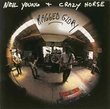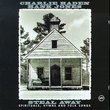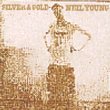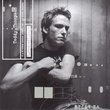| All Artists: Ry Cooder Title: Chavez Ravine Members Wishing: 5 Total Copies: 0 Label: Nonesuch Release Date: 6/14/2005 Genres: Country, Blues, Jazz, Pop, Rock, Classic Rock, Metal Styles: Americana, Contemporary Blues, Latin Jazz, Rock Guitarists, Album-Oriented Rock (AOR) Number of Discs: 1 SwapaCD Credits: 1 UPCs: 075597987720, 075597987768 |
Search - Ry Cooder :: Chavez Ravine
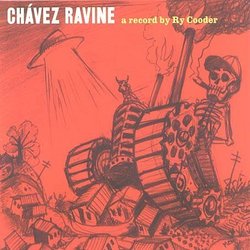 | Ry Cooder Chavez Ravine Genres: Country, Blues, Jazz, Pop, Rock, Classic Rock, Metal
Ry Cooder's Chavez Ravine is-a post-World War II-era American narrative of "cool cats," radios, UFO sightings, J.Edgar Hoover, red scares, and baseball.Using real and imagined historical characters, Cooder and friends crea... more » |
Larger Image |
CD DetailsSynopsis
Album Description Ry Cooder's Chavez Ravine is-a post-World War II-era American narrative of "cool cats," radios, UFO sightings, J.Edgar Hoover, red scares, and baseball.Using real and imagined historical characters, Cooder and friends creates an album that recollects various aspects of the poor but vibrant hillside Chicano cummunity, which was bulldozed by developed in the interest of "progress." Similarly Requested CDs
|
CD ReviewsBringing Home the Barrio Paul F. Starrs | El Cerrito, CA, and Reno, NV USA | 06/14/2005 (5 out of 5 stars) "It's not just that Ry Cooder has been producing albums for more than 35 years -- many of them solidly thematic, like the 1971 "Into the Purple Valley." He's more than a terrific guitarist (slide, originally, but now almost anything within the guitar world, and including, now, at least a dozen other instruments). He's done fine film soundtracks, some of his most sonorous work, and some earnest vocals, which he's better at than John Fahey or Leo Kottke and various other virtuoso guitarists, and he's improving still more. And he's a genius in popularizing and producing other sounds, which we all know of, and attained a degree of controversy with the *Buena Vista* albums and his assistance lent to an ascendancy of Caribbean, and especially Cuban, music. But why buy THIS album? How about 'cause it's stone-cold brilliant, capturing the late 1940s and 50s when the polyglot but predominantly Hispanic neighborhood at Chávez Ravine was displaced to allow what would become "Dodger Stadium" and orderly rows of suburban housing to replace the slightly hectic disorder previously there. But understand that this isn't a rabble-rousing album, or a call to arms; it's a reminder of what's gone by, hearkening to Don Normark's photographic study (also called *Chavez Ravine*, 1999), and it recognizes the fanatically purposeful energy that channelized and paved the L.A. River (see Blake Gumprecht's *L.A. River*, now in paperback). I'll take this musical treatment (with plenty of voices in it, though, and an astounding variety of themes) over the blunt muckraking of a Mike Davis anyday -- this is inspired stuff, in a huge assortment of styles, bringing in a number of the musical lights of Chávez Ravine in the era. They're mixed together, elegantly, and very nicely produced. Favorites? The album's a mix of contemporary songs and current-day compositions by Cooder. But I'm a big time fan, on ninth or ten listening, of "Poor Man's Shangri-la," "Onda Callejera," "El U.F.O. Cayó," "Ejercito Militar," and "3rd Base, Dodger Stadium," but it's a "you pick 'em" kind of album -- not one for casual listening, by and large (though there are some that'll be heard as singles). It's to sit down, work to, with part of your brain reserved for the passing of events -- and the exile of residents and importation of the Anglo suburbanites. The music is a beautiful thing, and having it tied to a story which has a venality we're all familiar with (just look around wherever you live; you'll see) brings the poignancy home -- without any sappy sadness; this is stand-up stuff." Master Cooder's Latest Gem of American Music Juan Mobili | Valley Cottage, NY USA | 06/18/2005 (5 out of 5 stars) "Ever since Chicken Skin Music -ironically, another beauty honoring the Mexican influence on American music- Cooder has been one of the "saints of my devotion," as my father used to say. In Chavez Ravine, an album he's been working on for about three years, Cooder researched the disappearance of an area of Los Angeles, and long-standing Mexican community, that was erased to make way for what would become Dodgers Stadium. The album that has resulted from his interest is, then, a political statement about the legacy of Joe McCarthy, an elegy about old neighborhoods paved over by a twisted sense of progress, and an amazing group of songs showing the deep gift of Mexican-American music. With the same cool touch and deep affection that Cooder already demonstrated for Malian music (Talkin' Timbuktu) and Cuban grooves (Mambo Sinuendo and Buena Vista Social Club), Ry gathered a host of incredible Mexican-American musicians from the Fifties, to invoke the spirit of this story. Ersi Arbizu, Lalo Guerrero, Don Tosti and Little Willie G. -all great performers, most of which may be unknowns to most of us- take turns singing songs that conjure up the longings, loves and betrayals from the Chavez Ravine odyssey. Now, let's be clear, do not think this is ethnographic research for the Smithsonian archives or a dry document of music gone by. This album grooves ("Poor Man's Shangri-La" or "Onda Callejera") and gets down ("Muy Fifi" and "3 Cool Cats") as well as it will move you with some slow burners ("It's Just Work For Me") and beautiful ballads ("In My Town," "3rd Base, Dodgers Stadium" and "Soy Luz Y Sombra"). In conclusion, this is some of the most soulful music you may come across this year. It proves, too, that you can move your body with abandon and reflect on serious issues at once. Meaning and grooving, with passion and concern, master Cooder takes us for another ride through the real America, where great and forgotten voices get to sing aloud again." A celebratory lament for what we have all lost David E. Rogers | Los Angeles, CA USA | 06/16/2005 (5 out of 5 stars) "I'm just old enough to remember the Dodgers playing in L.A.'s Coliseum--and my first look at the new Dodger Stadium, shining like a giant multicolored jewel in the hillsides of Chavez Ravine.
It's still one of the most beautiful stadiums in the world, but it was years before I learned that it rests on the site (in some cases, even on the ruins) of what was once a "Poor Man's Shangri-La," the three Mexican-American communities of Chavez Ravine. Spanning more than a decade, it's a sad tale, one of idealism twisted by red-baiting, racism, corrupt city officials, rampant deception and the power of Big Money. In "Chavez Ravine," Ry Cooder (perhaps best known for "Buena Vista Social Club") tells the story of Palo Verde, La Loma and Bishop as no one has before. Inspired by the photos of Don Normark, Cooder reignites the soul of Chavez Ravine in a marvelous blend of musical genre, lyrics and language. You'll hear voices since stilled by the years (Lalo Guerrero and Don Tosti), lost songs rediscovered ("Chinito, Chinito"), the visit and plea of a Space Vato ("El U.F.O. Cayo) and the memories of a 94-year-old hero ("Don't Call Me Red"). It's clear from Cooder's introduction in the excellent booklet that accompanies the CD that "Chavez Ravine" is not only a lament for the loss of a the Ravine's communities, but also for the urbanization of what once made Los Angeles so special. Growing up in the San Fernando Valley, I remember orange groves, unexpected old villages and semi-rural adventurelands--all now covered by big box retailers and faceless tract homes. Indeed, in much of the U.S. West, we have all lived the sad tale of Chavez Ravine. The power of Cooder's "Chavez Ravine" is how it remembers, retells, celebrates and mourns what we once had in plenty and now is slipping away." |

 Track Listings (15) - Disc #1
Track Listings (15) - Disc #1
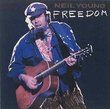
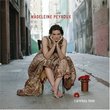

![Sly & the Family Stone - Greatest Hits [Epic]](https://nationalbookswap.com/cd//m/63/8263/18263.jpg)
